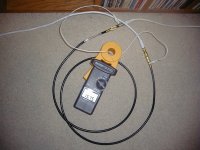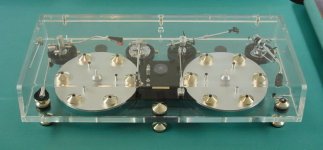Lorin Maazel’s Sibelius 5th on the turntable plus a massive glass of red wine.
The perfect followup must be Mazeels Mahler 4rh. Fantastic recording and performance.
//
I'd not call a gyro OTT, then again compared to Scott's U-turn almost everything seems extravagant.
I have two turntables. not sure quite what that makes me 🙂
I have two turntables. not sure quite what that makes me 🙂
A DJ?I have two turntables. not sure quite what that makes me 🙂
OK, scratch that remark! 🙂
I'd not call a gyro OTT, then again compared to Scott's U-turn almost everything seems extravagant.
I'm anti-posh these days $300 limit. I spent last Saturday listening to Kevin's totally bespoke valve amps and $$$ TT setup pretty nice but...
Well the Kenwood was free does that count 🙂
@Galu: Back in the 80s Michell did make a one off twin gyrodec that had either 3 or 4 arms on each bit. I can't remember if I saw it in the ortofon or the SME room (this was before SME made their own tables).
@Galu: Back in the 80s Michell did make a one off twin gyrodec that had either 3 or 4 arms on each bit. I can't remember if I saw it in the ortofon or the SME room (this was before SME made their own tables).
I guess this is it.@Galu: Back in the 80s Michell did make a one off twin gyrodec
Attachments
Indeed, philosophy of science as I see defined in Wikipekia.
Trouble is, this philosophy is controversial, arguable with ideologies and religions.
OTOH, history of sciences is 100% facts, no belief, no intention, just facts ( all the rest is bound to BS and will be )
Do you know what PhD means?
One would like to think that he is outside ideology, probably the worst potion to have if you deal with science.
As far as the rudimentary and compulsory courses of philosophy of science in universities go, one can argue about the usefulness of those. But if somebody wants to take a deeper dive, it might nudge them in the right direction and help them to maybe think more scientific and to avoid the posts like the one quoted in this message.
So there are substantial PE network currents causing such voltage drops ?, ie how is this 6V differential caused?.....In most residences there is a single breaker box. So the safety ground differences should be only from capacitive leakage current in the cable runs. In my slightly larger projects the safety ground differences can be more than 6 volts from one equipment room to another.
It is NOT capacitive. It is loop induction.
Jn
When I spec the audio system wiring, the hot and neutral are twisted with the safety ground left out.
But thanks for the korrection.
I am a MS in EE and PhD in Computer sciences.Do you know what PhD means?
One would like to think that he is outside ideology, probably the worst potion to have if you deal with science.
As far as the rudimentary and compulsory courses of philosophy of science in universities go, one can argue about the usefulness of those. But if somebody wants to take a deeper dive, it might nudge them in the right direction and help them to maybe think more scientific and to avoid the posts like the one quoted in this message.
I took a two term course in the 'History of Science and Technology' during my first year at university.
I spent so much time formulating my essay on the development of genetics that I failed my maths exam! 😀
Hehe.. At the University of Toronto there is (or was, but I assume it is still there) and Institute for the History and Philosophy of Science and Technology. They mostly do graduate programs but also offered sufficient undergrad courses that one could get a specialist degree in HPS. I did not, but I took several courses from the Institute. It was mostly very good stuff.
Of course, "history" is not simply a collection of "facts" but an evolving collection of data, analysis, and interpretation. Social history of science and medicine was a hot topic back when I was in school.
BTW my wife's best friend is an ex-journalist who was never very interested in STEM until she had a daughter. Now she paints portraits of female scientists from the past and does presentations to various groups on the topic.
I guess this is it.
Nope that's a double hydraulic reference. I didn't know they did that
I am a MS in EE and PhD in Computer sciences.
Yes. You are a Doctor of Philosophy.
Yes. You are a Doctor of Philosophy.
That's a nonsense.
PhD in Engineering | Study Engineering in the US
Doctor of Engineering - Wikipedia
The Doctor of Engineering and the PhD in Engineering are equivalent degrees. Both doctorates are research doctorates representing the highest academic qualification in engineering. As such, both EngD and PhD programs require students to develop original research leading to a dissertation defense. Furthermore, both doctorates enable holders to become faculty members at academic institutions. The EngD and PhD in Engineering are terminal degrees, allowing the recipient to obtain a tenure-track position.
So there are substantial PE network currents causing such voltage drops ?, ie how is this 6V differential caused?.
The US also uses 3 wire 3 phase, here in the UK it is 4 wire 3 phase, phase imbalances lead to ground errors.
The perfect followup must be Mazeels Mahler 4rh. Fantastic recording and performance.
//
I’ll have to try that - thanks
So there are substantial PE network currents causing such voltage drops ?, ie how is this 6V differential caused?.
I don’t think it’s correct to talk about ‘potential differences between grounds cause ground loops’ which you see all over the web. To my mind this smacks of common impedance coupling when the real issue is loop induction in the ground wiring that ends up flowing in the equipment interconnect ground which therefore means it’s in series with the signal, ergo hum etc
The 6 V as Ed says code allows, is for a fault condition. I’d be pretty worried about it if under normal operating conditions there were volts between safety ground terminals - that’s a serious issue.
Most ground wiring loops generate 100’s of uV and uA - not more. Focus on reducing loop area and the issue can normally be brought under control.
Last edited:
I don’t think it’s correct to talk about ‘potential differences between grounds cause ground loops’ which you see all over the web.
Most ground wiring loops generate 100’s of uV and uA - not more. Focus on reducing loop area and the issue can normally be brought under control.
Not so. This is a legal NEC system Untouched in a residential home. 15 mA, 60Hz flow between two earthed ground points.

Assumptions can kill you. Always measure.
THx-RNMarsh
Last edited:
- Status
- Not open for further replies.
- Home
- Member Areas
- The Lounge
- John Curl's Blowtorch preamplifier part III
